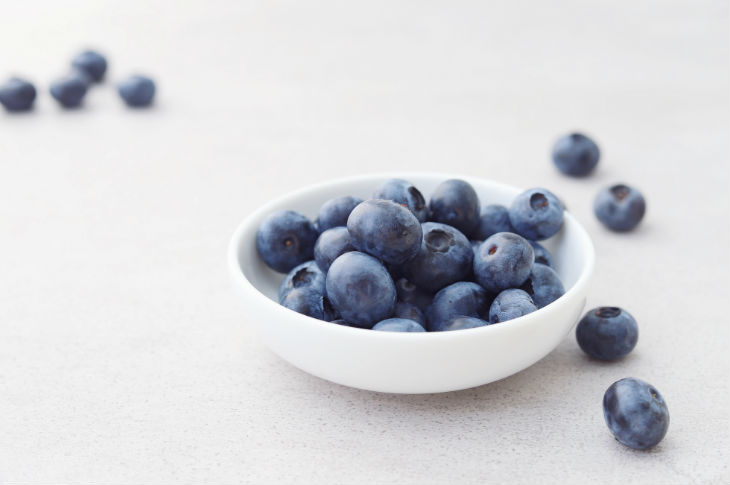
Your eating habits don’t just influence your weight and your heart health, they also impact your brain. If you’re eager to keep your mind healthy for the long term, consuming foods linked to better memory, cognition, and overall brain health may help.
“Certain foods, and especially certain dietary patterns, have been linked with fewer memory problems and cognitive impairment as you age,” says Samantha Cassetty, MS, RD, a registered dietitian based in New York City. “While you may not notice the benefit right away, it’s a good idea to eat as if your memory depends on it because it really does.”
In honor of Brain Awareness Week (March 16-22), add these foods to your menu:
Oily fish. Salmon and other types of oily fish are rich in omega-3 fatty acids, which is good for brain health. “Studies repeatedly link this type of fat to lower levels of inflammation in the body,” Cassetty says. “You can’t see this type of inflammation, but chronic, body-wide inflammation may promote diseases, like Alzheimer’s disease and dementia. Our modern, Western diet that’s full of convenience items provides way fewer of these anti-inflammatory fats, compared to other types of fats, but it’s better for your brain health to reverse this ratio and eat more anti-inflammatory fats.”
Experts recommend eating fish twice a week. Bake or broil salmon or trout with lemon or olive oil, or eat canned salmon or sardines over a salad.
Nuts and seeds. Fish is rich in the omega-3 fat known as docosahexaenoic acid (DHA). Nuts and seeds are also rich in omega-3s—a type known as alpha-linolenic acid (ALA). “Research suggests consuming ALA improves memory, retention, and learning,” says Kim Rose, RDN, a registered dietitian nutritionist based in Sebring, Florida.
Reach for walnuts, chia seeds, flaxseeds, or pumpkin seeds, which are rich in ALA, as well as magnesium, iron, zinc, and copper.
Berries. The antioxidants called flavonoids, which give berries their deep red, blue, and purple hues, make these tiny fruits excellent for your brain. Some research has shown that older women who eat flavonoid-rich blueberries and strawberries have slower rates of cognitive decline.
“Blueberries and other berries [also] contain anthocyanins, which have anti-inflammatory and antioxidant effects and help reduce brain aging,” says Amy Archer, RDN, a registered dietitian nutritionist based in Saratoga, California. “Try a little with your morning meal or a handful as a sweet snack.”
Leafy greens. A salad a day may protect your memory, according to a recent study which looked at the eating habits of adults aged 58 to 99. “About a serving of leafy green veggies—think kale and spinach—per day was associated with the memory of people 11 years younger, which is an incredibly dramatic benefit,” Cassetty says.
If you’re not the biggest fan of salads, add greens to a smoothie, or mix them into eggs, pasta dishes, or soup. “I love stirring a big fistful of baby spinach into a can of lower sodium lentil soup,” Cassetty says. “It brightens an otherwise brown bowl of food and adds some freshness to a convenience item.”
Turmeric. Turmeric is an antioxidant and anti-inflammatory associated with better brain health, although more research is needed. The active ingredient in this colorful spice is curcumin.
“While there is research regarding the use of curcumin related to brain health in disease states like Alzheimer’s disease and dementia, there is no conclusive evidence to indicate specific prophylactic use and dosage,” says Martha Lawder, MS, RDN, a registered dietitian nutritionist based in Roseville, California. “The turmeric spice can definitely be used in your culinary adventures as part of a well-balanced and healthy diet.”
Eggs. Whether scrambled, hard-boiled, or sunny side up, eggs are brain-friendly. “Eggs are an affordable protein food whose yolk provides choline and lutein, two phytonutrients that are pivotal for early brain development in the first 1,000 days after conceiving,” says Maggie Moon, MS, RD, a Los Angeles-based registered dietitian and author of The MIND Diet: A Scientific Approach to Enhancing Brain Function and Helping Prevent Alzheimer’s and Dementia. “Emerging research suggests lutein is just as important in slowing down age-related cognitive decline.”
Although they contain cholesterol, adults may eat an egg a day as part of a healthy diet, according to the American Heart Association.
Dark chocolate. Milk chocolate doesn’t have brain-health benefits, but dark chocolate is rich in flavonoids, so enjoying a square daily may be good for you.
“The special class of flavonoids in dark chocolate may be especially beneficial to your brain,” Cassetty says. “They’ve recently been shown to improve brain neuroplasticity, which essentially means that they may improve your ability to continue to learn as you age. Cocoa flavonols also increase blood flow to your brain, and they may reduce neuron loss and keep neuron connections healthy. This all translates to memory improvements and a lower risk of memory impairments.”
The post Foods That Boost Brain Health appeared first on Fitbit Blog.
source https://blog.fitbit.com/brain-healthy-foods/
No comments:
Post a Comment